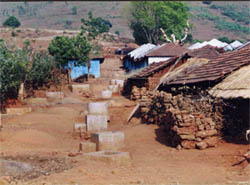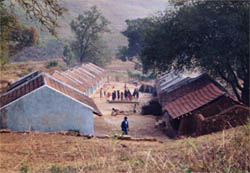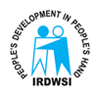WIDA PROGRAMMES
Consolidated Range of ActivitiesEnvironmental Issues - Climate Change
Social Forum
Community Education
After knowing the village, the staff analyze the existing power equations and decision making in the villages along with the people. I) Training, II) exposure, III) People’s organization meetings. Community development education programmes could mean basically education. The process of learning is initiated through” 1. Individual contact, 2. Group discussions, 3. community meetings, 4 village studies, 5 identification and training of village cadres and. 6 formation and role of people’s organization.
The educational programme is based on the analysis of the root causes of poverty of an individual and of the whole community. Key words are selected from the issues of the people and the people’s day you day struggle for life. A clear analysis on the selected words are made along with the people. The process of the educational programme and the interaction of the staff with the people. The process of the educational programme and the interaction of the staff with the people paved a way to identify the factors making people poor and richer in their own villages at a micro level.
Technical Programme
While we try to help village people to stay in the villages producing on the land they own cultivating a more intensively and retain them in the villages, preventing urban migration, it is inevitable that there are some people who have to find employment in urban centers. A part from training the youths in urban trades emphasis is given to identify and strengthen indigenous skills and rural artisans like pottery, blacksmith etc
Community Health Programme
The strategy on health is to evolve and educational programme based on the study on attitudes towards sickness, health practices, treatment and the local health systems, personnel like traditional birth attendants, native medical attendants and which-craft, attempts were made primarily to bring health consciousness and healthy practices among the people. The study on disease pattern reveal that most of the diseases could be either prevented, or by an early treatment of the common diseases could be overcome. Community health is the key element in the development programme. There is a community health team with a doctor and all the villages are covered by the health programme. Basic thrust of the community health programme is health education. Keeping in mind that most of the diseases are water-borne, our first commitments is to educate the people why clean drinking water is necessary. Where there are springs available, it is protected from pollution and contamination. Most of the villages are encouraged to have drinking water wells. In all cases, people’s participation with government health department at the block level.
Women’s Development
The educational programme is based on the study conducted by the nutritionist in the village on food habits likes and dislikes, taboos on food, local food, feeding habits, food customs, cooking methods, common diseases of children, child mortality, sources of food and livestock. The nutrition programme by the women’s department of the project was undertaken as an entry point for working amongst the women in order that a holistic approach to women’s development is evolved. This strategy proved extremely successful. First through nutrition education, the village communities are motivated to grow their own vegetables through kitchen gardens, however, our major success through nutrition programme is the organization of community women’s programme.
Communication Programme
Communication of course is quintessence of the success of programmes of awareness building and the resultant social change. The project has a communication team who are involved staging skits, dramas and other entertainment programmes, in all of which the context of social change which are extremely populate in the villages. The staff of the project recruited basically from the villages have been trained to write scripts, to compose songs and record them in cassettes and stage dramas themselves with music and all other requirements of this development project, so that this would become a development education material, both within the project area and also for other NGO’s.
Economic Development Programme
Awareness building and organization are the bedrock of our development programmes. The economic sustenance of the people rooted to religion and forest is the bedrock long term development of the people benefiting from the new enlightenment of awareness programmes. Without economics programmes include two kinds. First individual family benefits and the other community assets. All the economic programmes include two kinds. First individual family benefits and the other community assets. All the economic programmes have been undertaken. Economics programmes include two kinds. First individual family benefits and other community assets. All the economic programmes have been initiated in understanding the local economic systems and attempts to practically understand the essentials of money lending, mortgage, loan rate of interest, capital, investment, production, income, savings, reinvestment and utilizing to the maximum with the humanitarian and just values so that the economic programmes do not bring inequalities among people but promote a social equality, eco-economic justice- “a economic cultural therapy”. Participation in economic development does not mean just people share their labour, materials for a programme already decided. Our belief is that the people themselves take a collective decision through a genuine conscious process, with unified approach, come to a common consensus to develop methods to facilitate the decision making process for a genuine participation in development, through action and change.
Housing
With regard to this programme, we believe and realize housing is the only means shall hold together the development gains as otherwise all our health, nutrition, social education programme would be lost. Though it is an expensive affair, we believe housing provides confidence, security and a sense of pride. To many housing becomes a last priority and get into debate of food and clothing to be the first and shelter to be the last. In our experience we have come to an understanding that housing of the poor is a must and it is important to look shelter to be the central focus of a just and human development. At present due to degradation of forest housing materials have become very scarce and the vagaries of monsoon have put the poor into a continuous peril of survival. To comply and incapacitate the poor housing becomes a key instrument of motivation, responsibility and social accountability of the community. Locally available raw materials, local skills and people’s wisdom on construction of houses is given priority. By doing so we avoid imposing new techniques and housing models which may not be suitable and convenient to the poor.
 |

|
Government Co-operation
We have been enlisting government co-operation from the village level and to the block level through various schemes meant for uplifting the rural poor. Health, social forestry, housing, drinking water, immunization, education, skills training area some of the programme where we are able to cooperate with the poor. Apart from availing the facilities the project is actively participating in all the development related meetings organized by the government at the district levels.
Government of Oarsman's programmes have been implemented with the help of the project especially the immunization scheme, loans, pension schemes, environment programmes and technical training. The department of science and technology, new Delhi, government of India is an ardent supporter of IRDWSI and they entered into partnership with us in the fields of low cost housing, sericulture programme for women, aquaculture, rural and urban skills programme for tribal youth and development of primitive tribals, decentralized energy options (Mini Hydro Power Project and Solar Energy) and sustainable agriculture
Environmental Issues - Climate Change
The Conference of Parties (COP) is an association of all countries that have ratified or acceded to the UNFCCC and is responsible for keeping international efforts to address climate change on track. The COP 8 was held in Delhi from October 23 – November 1, 2002 which was continuation of series of meetings. Here are some daily bulletins of People Combating Hot Air (Cha) for connecting communities and UNFCCC–COP8 that were published at the time of meeting.
Social Forum
A
GLOBAL UPRISING AGAINST GLOBALISATION - A
Report on World Social Forum 2004
![]()
Jan 16. 'The city that never sleeps', as the locals call Mumbai, awoke to sloganeering and banner marches like it had never seen or heard before. Rights of every kind - land, water, women, children, sex, language... - were proclaimed and the corresponding wrongs strongly condemned.... more
POWER TO PEOPLE
A CASE STUDY ON POWERFUL PEOPLE
GLOBALISATION – HAND OUT
CASE STUDY ON ECONOMIC GLOBALISATION - ADVOCACY

